Personalities in the Western and African Perspectives Assignment 2022
VerifiedAdded on 2022/10/17
|8
|2106
|4
Assignment
AI Summary
Contribute Materials
Your contribution can guide someone’s learning journey. Share your
documents today.
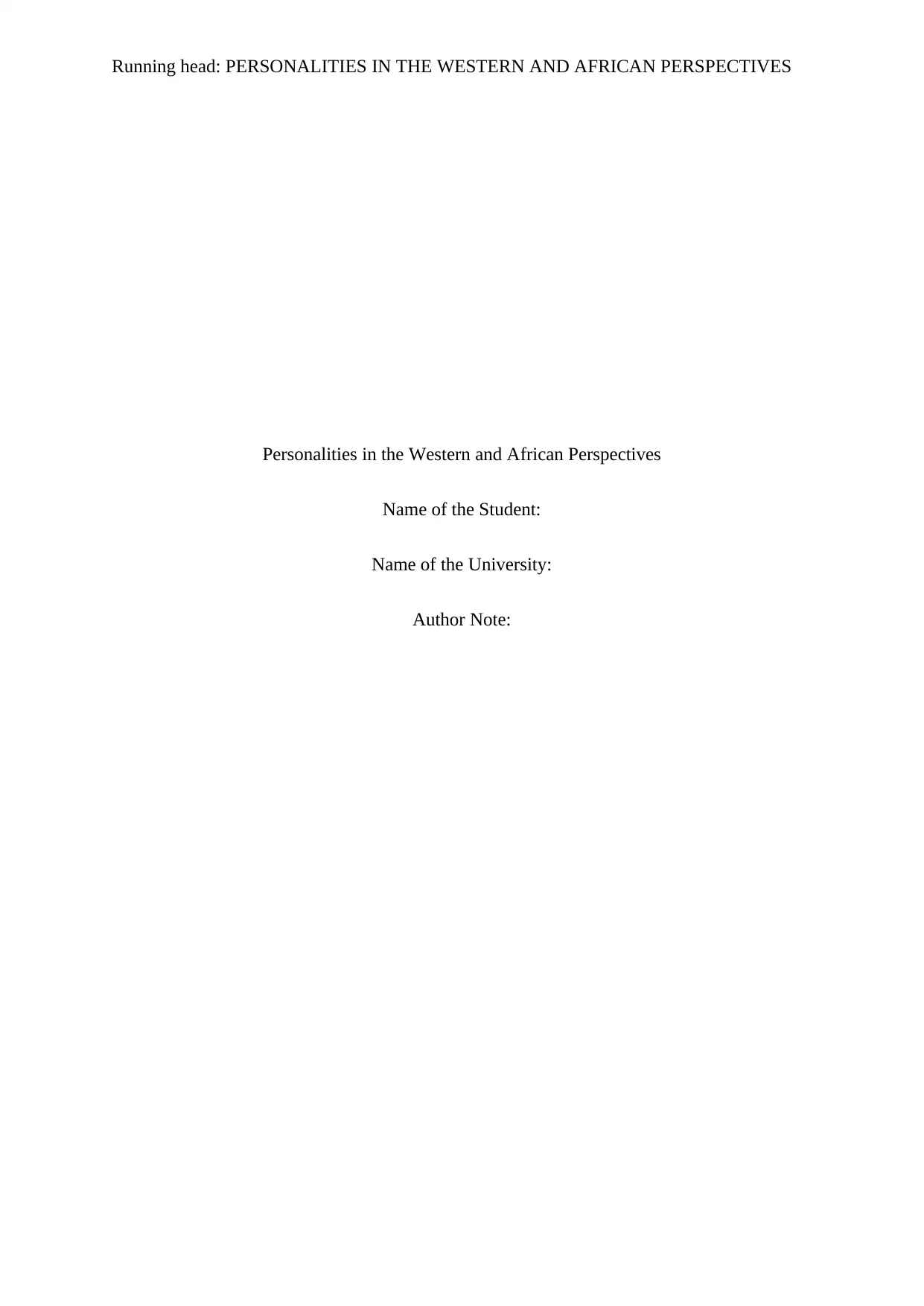
Running head: PERSONALITIES IN THE WESTERN AND AFRICAN PERSPECTIVES
Personalities in the Western and African Perspectives
Name of the Student:
Name of the University:
Author Note:
Personalities in the Western and African Perspectives
Name of the Student:
Name of the University:
Author Note:
Secure Best Marks with AI Grader
Need help grading? Try our AI Grader for instant feedback on your assignments.
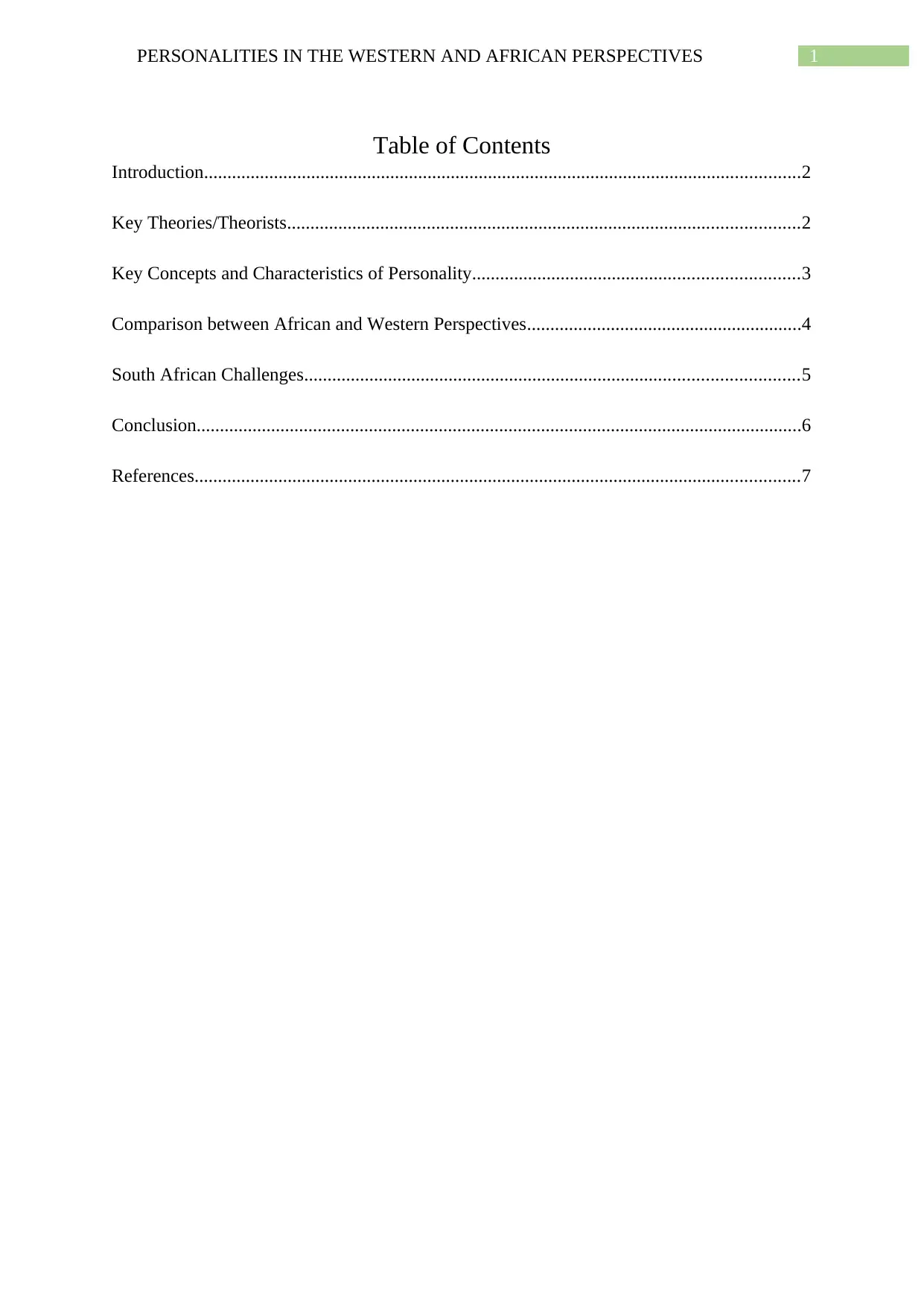
1PERSONALITIES IN THE WESTERN AND AFRICAN PERSPECTIVES
Table of Contents
Introduction................................................................................................................................2
Key Theories/Theorists..............................................................................................................2
Key Concepts and Characteristics of Personality......................................................................3
Comparison between African and Western Perspectives...........................................................4
South African Challenges..........................................................................................................5
Conclusion..................................................................................................................................6
References..................................................................................................................................7
Table of Contents
Introduction................................................................................................................................2
Key Theories/Theorists..............................................................................................................2
Key Concepts and Characteristics of Personality......................................................................3
Comparison between African and Western Perspectives...........................................................4
South African Challenges..........................................................................................................5
Conclusion..................................................................................................................................6
References..................................................................................................................................7
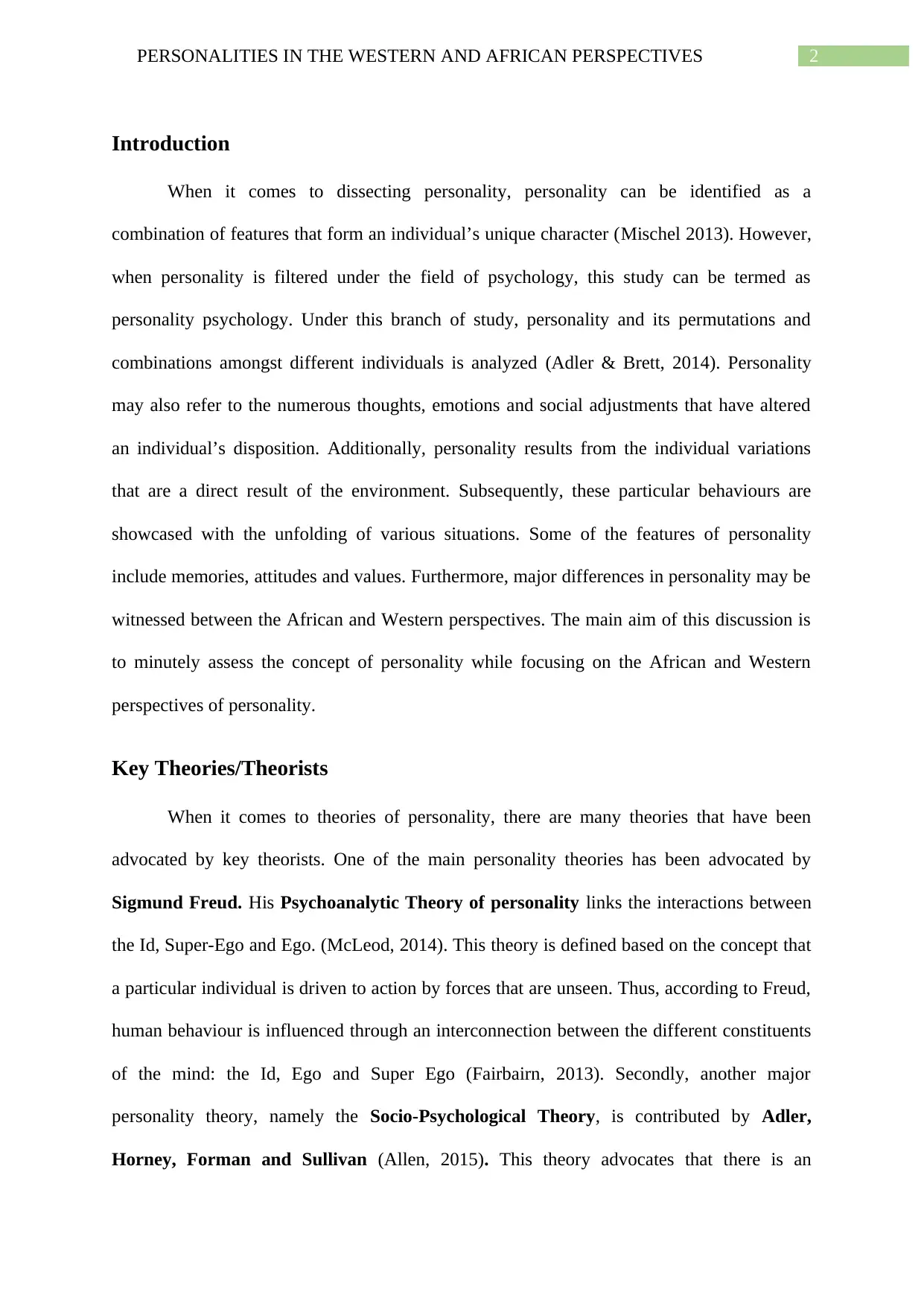
2PERSONALITIES IN THE WESTERN AND AFRICAN PERSPECTIVES
Introduction
When it comes to dissecting personality, personality can be identified as a
combination of features that form an individual’s unique character (Mischel 2013). However,
when personality is filtered under the field of psychology, this study can be termed as
personality psychology. Under this branch of study, personality and its permutations and
combinations amongst different individuals is analyzed (Adler & Brett, 2014). Personality
may also refer to the numerous thoughts, emotions and social adjustments that have altered
an individual’s disposition. Additionally, personality results from the individual variations
that are a direct result of the environment. Subsequently, these particular behaviours are
showcased with the unfolding of various situations. Some of the features of personality
include memories, attitudes and values. Furthermore, major differences in personality may be
witnessed between the African and Western perspectives. The main aim of this discussion is
to minutely assess the concept of personality while focusing on the African and Western
perspectives of personality.
Key Theories/Theorists
When it comes to theories of personality, there are many theories that have been
advocated by key theorists. One of the main personality theories has been advocated by
Sigmund Freud. His Psychoanalytic Theory of personality links the interactions between
the Id, Super-Ego and Ego. (McLeod, 2014). This theory is defined based on the concept that
a particular individual is driven to action by forces that are unseen. Thus, according to Freud,
human behaviour is influenced through an interconnection between the different constituents
of the mind: the Id, Ego and Super Ego (Fairbairn, 2013). Secondly, another major
personality theory, namely the Socio-Psychological Theory, is contributed by Adler,
Horney, Forman and Sullivan (Allen, 2015). This theory advocates that there is an
Introduction
When it comes to dissecting personality, personality can be identified as a
combination of features that form an individual’s unique character (Mischel 2013). However,
when personality is filtered under the field of psychology, this study can be termed as
personality psychology. Under this branch of study, personality and its permutations and
combinations amongst different individuals is analyzed (Adler & Brett, 2014). Personality
may also refer to the numerous thoughts, emotions and social adjustments that have altered
an individual’s disposition. Additionally, personality results from the individual variations
that are a direct result of the environment. Subsequently, these particular behaviours are
showcased with the unfolding of various situations. Some of the features of personality
include memories, attitudes and values. Furthermore, major differences in personality may be
witnessed between the African and Western perspectives. The main aim of this discussion is
to minutely assess the concept of personality while focusing on the African and Western
perspectives of personality.
Key Theories/Theorists
When it comes to theories of personality, there are many theories that have been
advocated by key theorists. One of the main personality theories has been advocated by
Sigmund Freud. His Psychoanalytic Theory of personality links the interactions between
the Id, Super-Ego and Ego. (McLeod, 2014). This theory is defined based on the concept that
a particular individual is driven to action by forces that are unseen. Thus, according to Freud,
human behaviour is influenced through an interconnection between the different constituents
of the mind: the Id, Ego and Super Ego (Fairbairn, 2013). Secondly, another major
personality theory, namely the Socio-Psychological Theory, is contributed by Adler,
Horney, Forman and Sullivan (Allen, 2015). This theory advocates that there is an
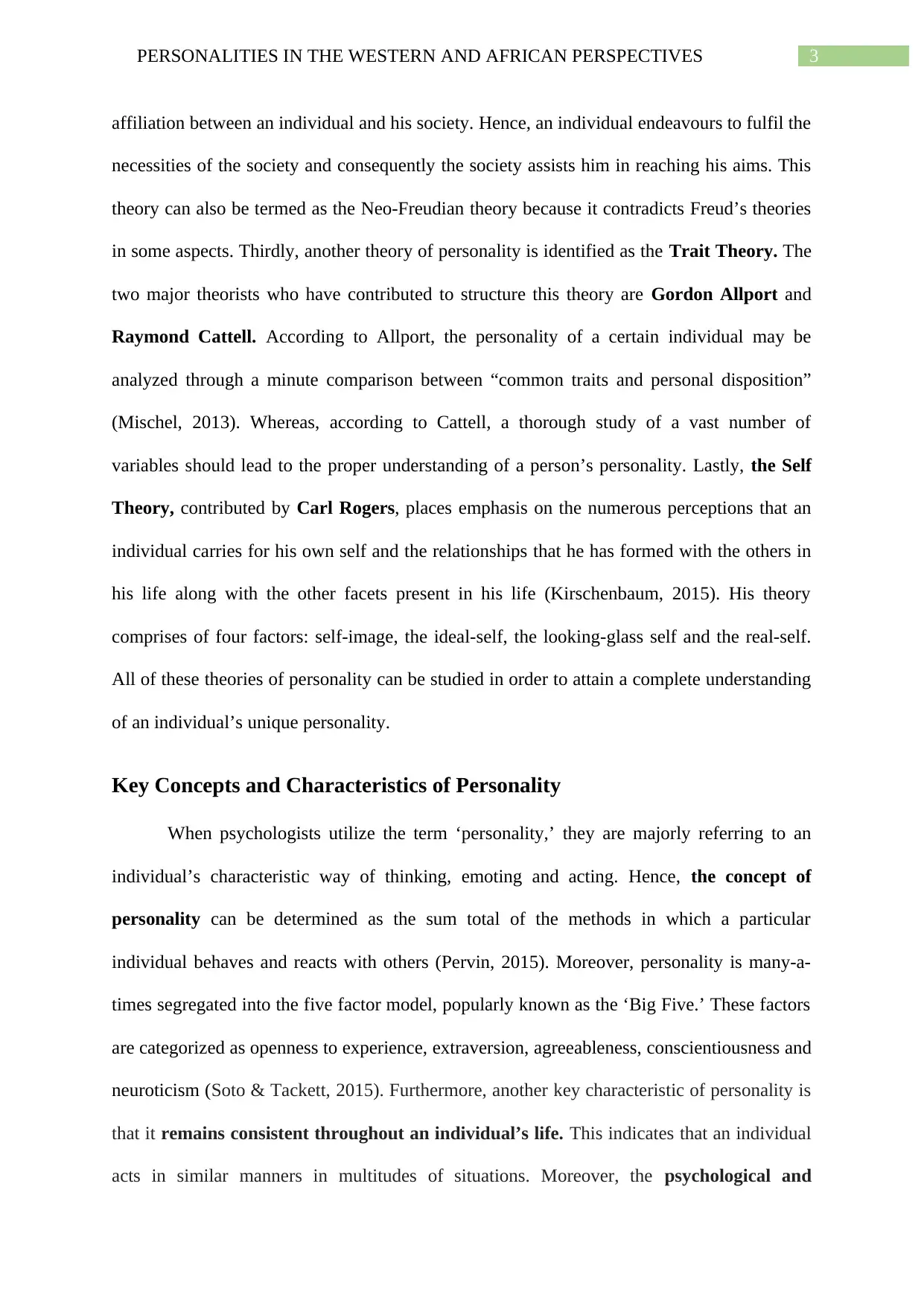
3PERSONALITIES IN THE WESTERN AND AFRICAN PERSPECTIVES
affiliation between an individual and his society. Hence, an individual endeavours to fulfil the
necessities of the society and consequently the society assists him in reaching his aims. This
theory can also be termed as the Neo-Freudian theory because it contradicts Freud’s theories
in some aspects. Thirdly, another theory of personality is identified as the Trait Theory. The
two major theorists who have contributed to structure this theory are Gordon Allport and
Raymond Cattell. According to Allport, the personality of a certain individual may be
analyzed through a minute comparison between “common traits and personal disposition”
(Mischel, 2013). Whereas, according to Cattell, a thorough study of a vast number of
variables should lead to the proper understanding of a person’s personality. Lastly, the Self
Theory, contributed by Carl Rogers, places emphasis on the numerous perceptions that an
individual carries for his own self and the relationships that he has formed with the others in
his life along with the other facets present in his life (Kirschenbaum, 2015). His theory
comprises of four factors: self-image, the ideal-self, the looking-glass self and the real-self.
All of these theories of personality can be studied in order to attain a complete understanding
of an individual’s unique personality.
Key Concepts and Characteristics of Personality
When psychologists utilize the term ‘personality,’ they are majorly referring to an
individual’s characteristic way of thinking, emoting and acting. Hence, the concept of
personality can be determined as the sum total of the methods in which a particular
individual behaves and reacts with others (Pervin, 2015). Moreover, personality is many-a-
times segregated into the five factor model, popularly known as the ‘Big Five.’ These factors
are categorized as openness to experience, extraversion, agreeableness, conscientiousness and
neuroticism (Soto & Tackett, 2015). Furthermore, another key characteristic of personality is
that it remains consistent throughout an individual’s life. This indicates that an individual
acts in similar manners in multitudes of situations. Moreover, the psychological and
affiliation between an individual and his society. Hence, an individual endeavours to fulfil the
necessities of the society and consequently the society assists him in reaching his aims. This
theory can also be termed as the Neo-Freudian theory because it contradicts Freud’s theories
in some aspects. Thirdly, another theory of personality is identified as the Trait Theory. The
two major theorists who have contributed to structure this theory are Gordon Allport and
Raymond Cattell. According to Allport, the personality of a certain individual may be
analyzed through a minute comparison between “common traits and personal disposition”
(Mischel, 2013). Whereas, according to Cattell, a thorough study of a vast number of
variables should lead to the proper understanding of a person’s personality. Lastly, the Self
Theory, contributed by Carl Rogers, places emphasis on the numerous perceptions that an
individual carries for his own self and the relationships that he has formed with the others in
his life along with the other facets present in his life (Kirschenbaum, 2015). His theory
comprises of four factors: self-image, the ideal-self, the looking-glass self and the real-self.
All of these theories of personality can be studied in order to attain a complete understanding
of an individual’s unique personality.
Key Concepts and Characteristics of Personality
When psychologists utilize the term ‘personality,’ they are majorly referring to an
individual’s characteristic way of thinking, emoting and acting. Hence, the concept of
personality can be determined as the sum total of the methods in which a particular
individual behaves and reacts with others (Pervin, 2015). Moreover, personality is many-a-
times segregated into the five factor model, popularly known as the ‘Big Five.’ These factors
are categorized as openness to experience, extraversion, agreeableness, conscientiousness and
neuroticism (Soto & Tackett, 2015). Furthermore, another key characteristic of personality is
that it remains consistent throughout an individual’s life. This indicates that an individual
acts in similar manners in multitudes of situations. Moreover, the psychological and
Secure Best Marks with AI Grader
Need help grading? Try our AI Grader for instant feedback on your assignments.
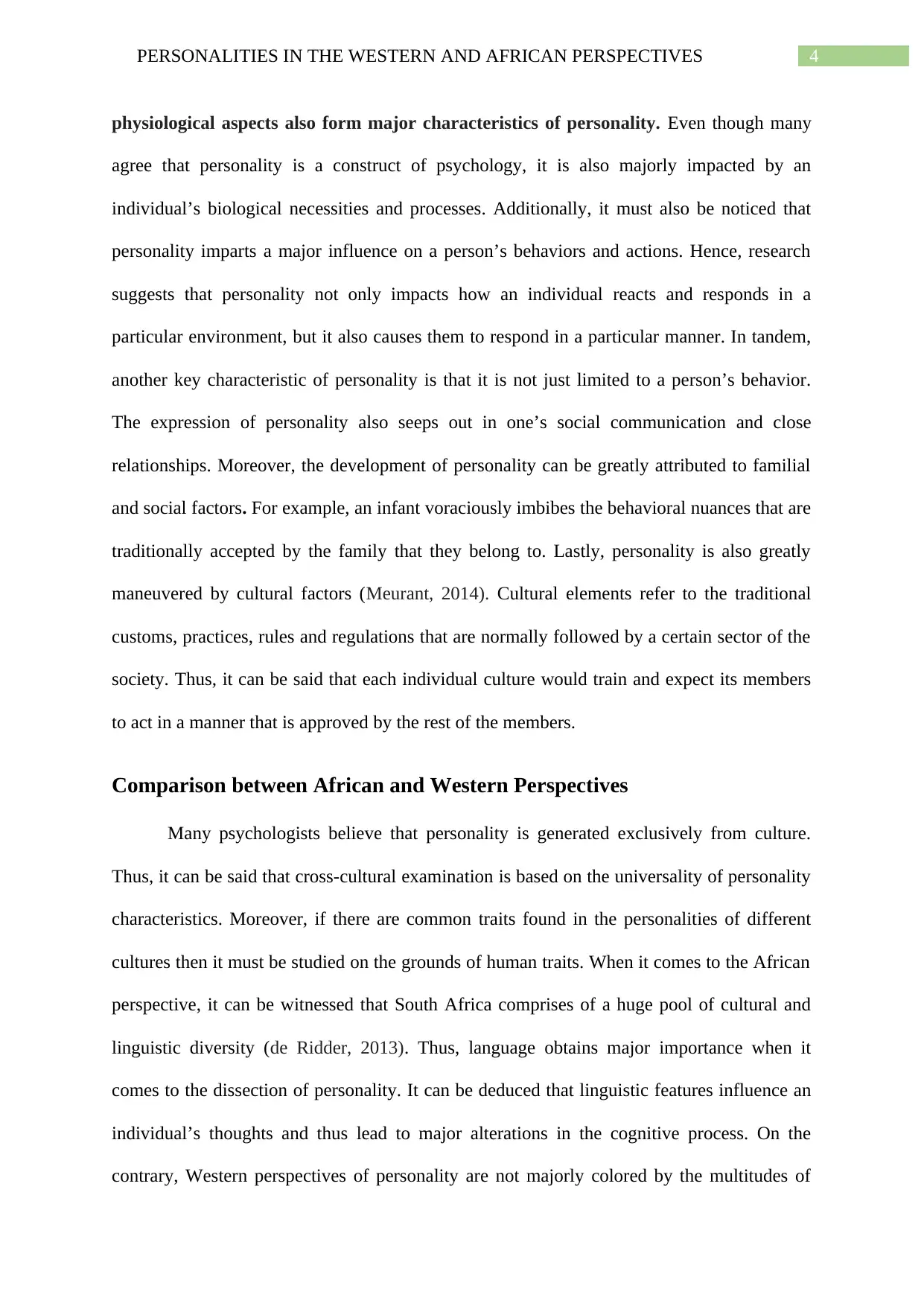
4PERSONALITIES IN THE WESTERN AND AFRICAN PERSPECTIVES
physiological aspects also form major characteristics of personality. Even though many
agree that personality is a construct of psychology, it is also majorly impacted by an
individual’s biological necessities and processes. Additionally, it must also be noticed that
personality imparts a major influence on a person’s behaviors and actions. Hence, research
suggests that personality not only impacts how an individual reacts and responds in a
particular environment, but it also causes them to respond in a particular manner. In tandem,
another key characteristic of personality is that it is not just limited to a person’s behavior.
The expression of personality also seeps out in one’s social communication and close
relationships. Moreover, the development of personality can be greatly attributed to familial
and social factors. For example, an infant voraciously imbibes the behavioral nuances that are
traditionally accepted by the family that they belong to. Lastly, personality is also greatly
maneuvered by cultural factors (Meurant, 2014). Cultural elements refer to the traditional
customs, practices, rules and regulations that are normally followed by a certain sector of the
society. Thus, it can be said that each individual culture would train and expect its members
to act in a manner that is approved by the rest of the members.
Comparison between African and Western Perspectives
Many psychologists believe that personality is generated exclusively from culture.
Thus, it can be said that cross-cultural examination is based on the universality of personality
characteristics. Moreover, if there are common traits found in the personalities of different
cultures then it must be studied on the grounds of human traits. When it comes to the African
perspective, it can be witnessed that South Africa comprises of a huge pool of cultural and
linguistic diversity (de Ridder, 2013). Thus, language obtains major importance when it
comes to the dissection of personality. It can be deduced that linguistic features influence an
individual’s thoughts and thus lead to major alterations in the cognitive process. On the
contrary, Western perspectives of personality are not majorly colored by the multitudes of
physiological aspects also form major characteristics of personality. Even though many
agree that personality is a construct of psychology, it is also majorly impacted by an
individual’s biological necessities and processes. Additionally, it must also be noticed that
personality imparts a major influence on a person’s behaviors and actions. Hence, research
suggests that personality not only impacts how an individual reacts and responds in a
particular environment, but it also causes them to respond in a particular manner. In tandem,
another key characteristic of personality is that it is not just limited to a person’s behavior.
The expression of personality also seeps out in one’s social communication and close
relationships. Moreover, the development of personality can be greatly attributed to familial
and social factors. For example, an infant voraciously imbibes the behavioral nuances that are
traditionally accepted by the family that they belong to. Lastly, personality is also greatly
maneuvered by cultural factors (Meurant, 2014). Cultural elements refer to the traditional
customs, practices, rules and regulations that are normally followed by a certain sector of the
society. Thus, it can be said that each individual culture would train and expect its members
to act in a manner that is approved by the rest of the members.
Comparison between African and Western Perspectives
Many psychologists believe that personality is generated exclusively from culture.
Thus, it can be said that cross-cultural examination is based on the universality of personality
characteristics. Moreover, if there are common traits found in the personalities of different
cultures then it must be studied on the grounds of human traits. When it comes to the African
perspective, it can be witnessed that South Africa comprises of a huge pool of cultural and
linguistic diversity (de Ridder, 2013). Thus, language obtains major importance when it
comes to the dissection of personality. It can be deduced that linguistic features influence an
individual’s thoughts and thus lead to major alterations in the cognitive process. On the
contrary, Western perspectives of personality are not majorly colored by the multitudes of
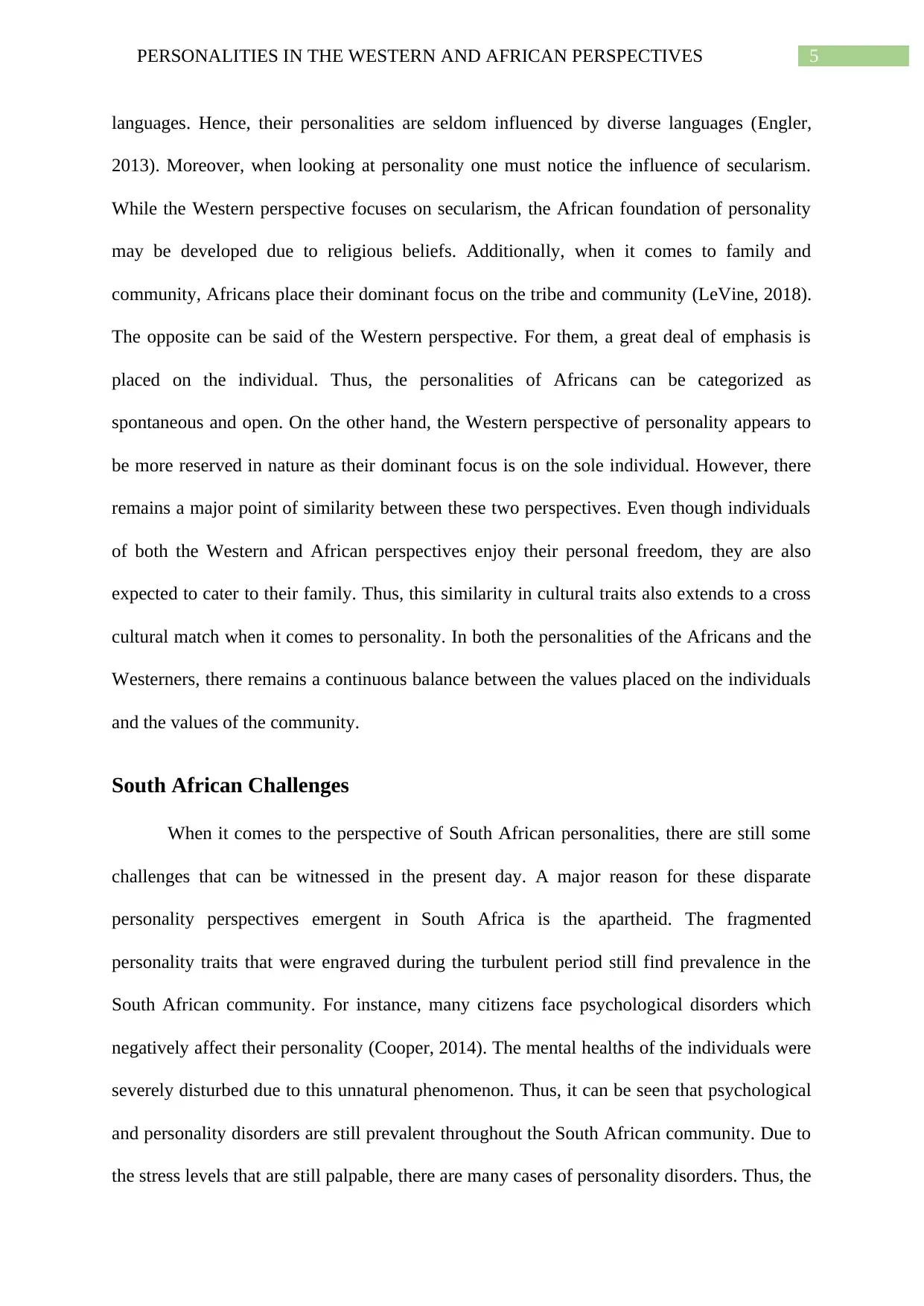
5PERSONALITIES IN THE WESTERN AND AFRICAN PERSPECTIVES
languages. Hence, their personalities are seldom influenced by diverse languages (Engler,
2013). Moreover, when looking at personality one must notice the influence of secularism.
While the Western perspective focuses on secularism, the African foundation of personality
may be developed due to religious beliefs. Additionally, when it comes to family and
community, Africans place their dominant focus on the tribe and community (LeVine, 2018).
The opposite can be said of the Western perspective. For them, a great deal of emphasis is
placed on the individual. Thus, the personalities of Africans can be categorized as
spontaneous and open. On the other hand, the Western perspective of personality appears to
be more reserved in nature as their dominant focus is on the sole individual. However, there
remains a major point of similarity between these two perspectives. Even though individuals
of both the Western and African perspectives enjoy their personal freedom, they are also
expected to cater to their family. Thus, this similarity in cultural traits also extends to a cross
cultural match when it comes to personality. In both the personalities of the Africans and the
Westerners, there remains a continuous balance between the values placed on the individuals
and the values of the community.
South African Challenges
When it comes to the perspective of South African personalities, there are still some
challenges that can be witnessed in the present day. A major reason for these disparate
personality perspectives emergent in South Africa is the apartheid. The fragmented
personality traits that were engraved during the turbulent period still find prevalence in the
South African community. For instance, many citizens face psychological disorders which
negatively affect their personality (Cooper, 2014). The mental healths of the individuals were
severely disturbed due to this unnatural phenomenon. Thus, it can be seen that psychological
and personality disorders are still prevalent throughout the South African community. Due to
the stress levels that are still palpable, there are many cases of personality disorders. Thus, the
languages. Hence, their personalities are seldom influenced by diverse languages (Engler,
2013). Moreover, when looking at personality one must notice the influence of secularism.
While the Western perspective focuses on secularism, the African foundation of personality
may be developed due to religious beliefs. Additionally, when it comes to family and
community, Africans place their dominant focus on the tribe and community (LeVine, 2018).
The opposite can be said of the Western perspective. For them, a great deal of emphasis is
placed on the individual. Thus, the personalities of Africans can be categorized as
spontaneous and open. On the other hand, the Western perspective of personality appears to
be more reserved in nature as their dominant focus is on the sole individual. However, there
remains a major point of similarity between these two perspectives. Even though individuals
of both the Western and African perspectives enjoy their personal freedom, they are also
expected to cater to their family. Thus, this similarity in cultural traits also extends to a cross
cultural match when it comes to personality. In both the personalities of the Africans and the
Westerners, there remains a continuous balance between the values placed on the individuals
and the values of the community.
South African Challenges
When it comes to the perspective of South African personalities, there are still some
challenges that can be witnessed in the present day. A major reason for these disparate
personality perspectives emergent in South Africa is the apartheid. The fragmented
personality traits that were engraved during the turbulent period still find prevalence in the
South African community. For instance, many citizens face psychological disorders which
negatively affect their personality (Cooper, 2014). The mental healths of the individuals were
severely disturbed due to this unnatural phenomenon. Thus, it can be seen that psychological
and personality disorders are still prevalent throughout the South African community. Due to
the stress levels that are still palpable, there are many cases of personality disorders. Thus, the
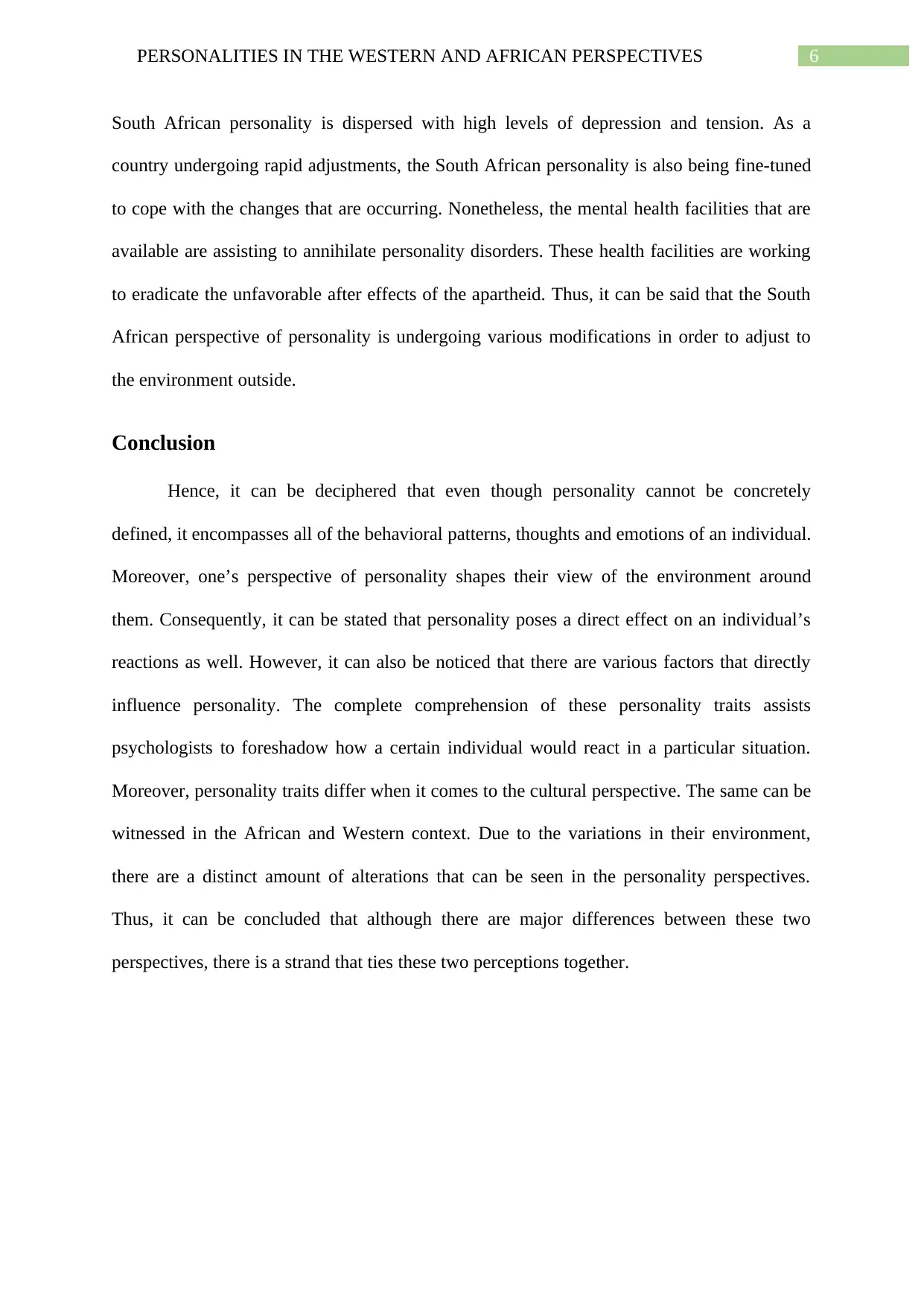
6PERSONALITIES IN THE WESTERN AND AFRICAN PERSPECTIVES
South African personality is dispersed with high levels of depression and tension. As a
country undergoing rapid adjustments, the South African personality is also being fine-tuned
to cope with the changes that are occurring. Nonetheless, the mental health facilities that are
available are assisting to annihilate personality disorders. These health facilities are working
to eradicate the unfavorable after effects of the apartheid. Thus, it can be said that the South
African perspective of personality is undergoing various modifications in order to adjust to
the environment outside.
Conclusion
Hence, it can be deciphered that even though personality cannot be concretely
defined, it encompasses all of the behavioral patterns, thoughts and emotions of an individual.
Moreover, one’s perspective of personality shapes their view of the environment around
them. Consequently, it can be stated that personality poses a direct effect on an individual’s
reactions as well. However, it can also be noticed that there are various factors that directly
influence personality. The complete comprehension of these personality traits assists
psychologists to foreshadow how a certain individual would react in a particular situation.
Moreover, personality traits differ when it comes to the cultural perspective. The same can be
witnessed in the African and Western context. Due to the variations in their environment,
there are a distinct amount of alterations that can be seen in the personality perspectives.
Thus, it can be concluded that although there are major differences between these two
perspectives, there is a strand that ties these two perceptions together.
South African personality is dispersed with high levels of depression and tension. As a
country undergoing rapid adjustments, the South African personality is also being fine-tuned
to cope with the changes that are occurring. Nonetheless, the mental health facilities that are
available are assisting to annihilate personality disorders. These health facilities are working
to eradicate the unfavorable after effects of the apartheid. Thus, it can be said that the South
African perspective of personality is undergoing various modifications in order to adjust to
the environment outside.
Conclusion
Hence, it can be deciphered that even though personality cannot be concretely
defined, it encompasses all of the behavioral patterns, thoughts and emotions of an individual.
Moreover, one’s perspective of personality shapes their view of the environment around
them. Consequently, it can be stated that personality poses a direct effect on an individual’s
reactions as well. However, it can also be noticed that there are various factors that directly
influence personality. The complete comprehension of these personality traits assists
psychologists to foreshadow how a certain individual would react in a particular situation.
Moreover, personality traits differ when it comes to the cultural perspective. The same can be
witnessed in the African and Western context. Due to the variations in their environment,
there are a distinct amount of alterations that can be seen in the personality perspectives.
Thus, it can be concluded that although there are major differences between these two
perspectives, there is a strand that ties these two perceptions together.
Paraphrase This Document
Need a fresh take? Get an instant paraphrase of this document with our AI Paraphraser
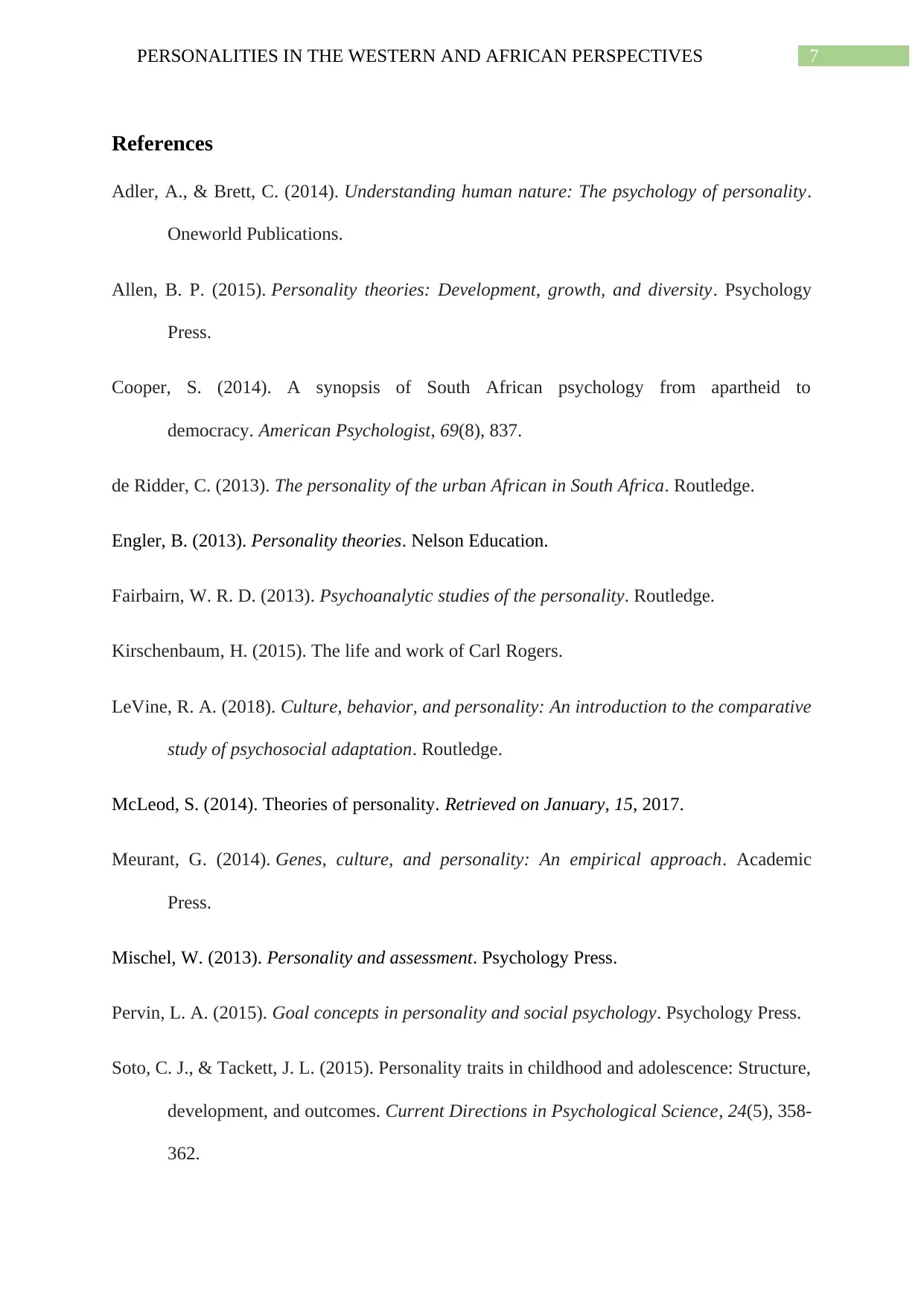
7PERSONALITIES IN THE WESTERN AND AFRICAN PERSPECTIVES
References
Adler, A., & Brett, C. (2014). Understanding human nature: The psychology of personality.
Oneworld Publications.
Allen, B. P. (2015). Personality theories: Development, growth, and diversity. Psychology
Press.
Cooper, S. (2014). A synopsis of South African psychology from apartheid to
democracy. American Psychologist, 69(8), 837.
de Ridder, C. (2013). The personality of the urban African in South Africa. Routledge.
Engler, B. (2013). Personality theories. Nelson Education.
Fairbairn, W. R. D. (2013). Psychoanalytic studies of the personality. Routledge.
Kirschenbaum, H. (2015). The life and work of Carl Rogers.
LeVine, R. A. (2018). Culture, behavior, and personality: An introduction to the comparative
study of psychosocial adaptation. Routledge.
McLeod, S. (2014). Theories of personality. Retrieved on January, 15, 2017.
Meurant, G. (2014). Genes, culture, and personality: An empirical approach. Academic
Press.
Mischel, W. (2013). Personality and assessment. Psychology Press.
Pervin, L. A. (2015). Goal concepts in personality and social psychology. Psychology Press.
Soto, C. J., & Tackett, J. L. (2015). Personality traits in childhood and adolescence: Structure,
development, and outcomes. Current Directions in Psychological Science, 24(5), 358-
362.
References
Adler, A., & Brett, C. (2014). Understanding human nature: The psychology of personality.
Oneworld Publications.
Allen, B. P. (2015). Personality theories: Development, growth, and diversity. Psychology
Press.
Cooper, S. (2014). A synopsis of South African psychology from apartheid to
democracy. American Psychologist, 69(8), 837.
de Ridder, C. (2013). The personality of the urban African in South Africa. Routledge.
Engler, B. (2013). Personality theories. Nelson Education.
Fairbairn, W. R. D. (2013). Psychoanalytic studies of the personality. Routledge.
Kirschenbaum, H. (2015). The life and work of Carl Rogers.
LeVine, R. A. (2018). Culture, behavior, and personality: An introduction to the comparative
study of psychosocial adaptation. Routledge.
McLeod, S. (2014). Theories of personality. Retrieved on January, 15, 2017.
Meurant, G. (2014). Genes, culture, and personality: An empirical approach. Academic
Press.
Mischel, W. (2013). Personality and assessment. Psychology Press.
Pervin, L. A. (2015). Goal concepts in personality and social psychology. Psychology Press.
Soto, C. J., & Tackett, J. L. (2015). Personality traits in childhood and adolescence: Structure,
development, and outcomes. Current Directions in Psychological Science, 24(5), 358-
362.
1 out of 8
Your All-in-One AI-Powered Toolkit for Academic Success.
+13062052269
info@desklib.com
Available 24*7 on WhatsApp / Email
![[object Object]](/_next/static/media/star-bottom.7253800d.svg)
Unlock your academic potential
© 2024 | Zucol Services PVT LTD | All rights reserved.


